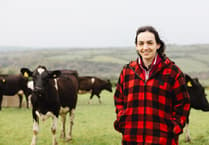MEMBERS of a farming union have raised concerns over plans to reintroduce beavers into the wild along the River Dyfi.
Concern over proposals from the North Wales Wildlife Trust to reintroduce beavers to the area brought together a strong contingent of NFU Cymru members at a recent meeting.
Early in 2022, a proposal was announced by the North Wales Wildlife Trust to release a wild population of Beavers on the River Dyfi.
The Welsh Beaver Project has been investigating the feasibility of bringing wild beavers back to Wales since 2005.
Any further release is subject to the granting of a new and separate licence by Natural Resources Wales (NRW) and to date, no application has been received by NRW.
NFU Cymru is opposed generally to species re-introduction programmes as resources can be used much more effectively to improve existing biodiversity.
NFU Cymru members who farm in the area have raised concern over the trust’s plans and feel that beavers are not an appropriate species for the area.
Beavers have been extinct in Wales for over 400 years; the landscapes and their management have changed significantly in that time.
NFU Cymru Montgomeryshire Vice-County Chairman, and resident of the Dyfi Valley, Dafydd Parry-Jones said: “We are very concerned by the plans to re-introduce a wild population of beavers in the Dyfi area and that is why we hosted a meeting for members at Dolgelynen Farm to voice their concerns.
“The meeting was very well attended, and it was a privilege to see so many present to discuss the potential impacts this may have on our rural community and demonstrating the strength of feeling.”
It is proposed that beavers will help encourage biodiversity in the area and provide a form of natural flood management. However, NFU Cymru members in the area are already part of schemes implementing successful natural flood management strategies which would include structures such as leaky dams. Beaver dams are not as effective in managing the flow of water and can often be swept away with strong surges which could have severe effects down river.
Mr Parry-Jones added: “Why do we need to rely on wild animals, who’s habits are at best unpredictable, to do similar roles already effectively undertaken. Their work is likely to be in the wrong location and in the case of their dams, not as leaky.
“We know this area; we live and breathe it in fact, and we do not wish for the delicate balance of its ecosystem to be upset by a species we haven’t lived with for centuries. As custodians of the land, we work tirelessly to improve our practices to encourage biodiversity in order to safeguard its future.”
NFU Cymru believes that the potential for beavers to cause problems in the landscape for farmland and farm businesses, existing habitat and biodiversity is considerable. There are no natural predators for beavers. Hence, such reintroductions of Eurasian Beavers are not suited to Wales.
There are other projects in the UK where beavers have been re-introduced namely in Scotland and Devon. There are many reports available detailing the impact of the beavers to their surroundings and it is clear that their ‘benefits’ come at a price.
Mr Parry Jones added: “There are species in Wales that are in decline, species that have survived here in harmony with us for many years. Our focus should be on protecting them not introducing an animal that its benefits are not assured. Let’s prioritise our efforts on our native species to ensure their future.
“Throughout the pandemic we were encouraged to follow the science and any approach to intervene with local habitats and biodiversity must be done with ratified scientific evidence. Welsh Government funding has been granted to develop this work – is this the right way to support rural communities and encourage their future?”
NFU Cymru would strongly encourage members to join the workshops hosted by the North Wales Wildlife Trust and communicate their concerns. Any members likely to be affected are also encouraged to get in touch with their local NFU Cymru office to express their views.





Comments
This article has no comments yet. Be the first to leave a comment.